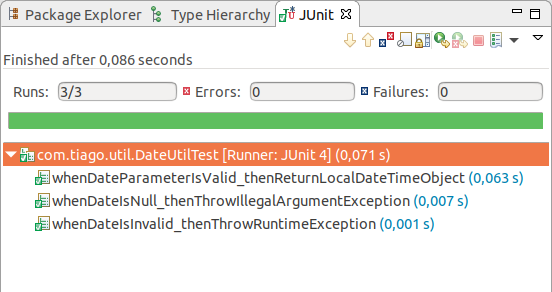Java: how to assert exception messages with JUnit 4

Have you ever wanted to assert exception messages in your unit tests? Let’s do this.
Introduction
It’s easy to write a unit test to check if a certain exception is thrown, like this:
@Test(expected = IndexOutOfBoundsException.class)
public void testIndexOutOfBoundsException() {
ArrayList emptyList = new ArrayList();
Object o = emptyList.get(0);
}
But we may want to assert the exception’s message as well.
The test project
I’ve wrote a small project using Spring Boot to illustrate the following situation: if we have, let’s say, a utility class that deals with dates and different exceptions can be thrown depending on the kind of error, how can we effectively test it?
The classes
This is our utility class:
package com.tiago.util;
import java.time.LocalDateTime;
import java.time.format.DateTimeFormatter;
import java.time.format.DateTimeParseException;
import org.springframework.stereotype.Component;
/**
* Utility class that deals with dates.
*
* @author Tiago Melo (tiagoharris@gmail.com)
*
*/
@Component
public class DateUtil {
public static final DateTimeFormatter FORMATTER = DateTimeFormatter.ofPattern("yyyy-MM-dd.HH:mm:ss");
/**
* Parse a String to a LocalDateTime object.
*
* @param date the String in "yyyy-MM-dd.HH:mm:ss" format
* @return LocalDateTime
* @throws IllegalArgumentException if date parameter is null
* @throws DateTimeParseException if date parameter is in invalid format
*/
public static LocalDateTime parse(String date) {
if(date == null) {
throw new IllegalArgumentException("date parameter is null");
}
LocalDateTime ldt = null;
try {
ldt = LocalDateTime.parse(date, FORMATTER);
} catch (DateTimeParseException e) {
throw new RuntimeException("\"" + date + "\" is not a valid date");
}
return ldt;
}
}
So, if the ‘date’ parameter is null, an ‘IllegalArgumentException’ is thrown; otherwise, a ‘RuntimeException’ is thrown if it’s in an invalid format.
This is how we can test it:
package com.tiago.util;
import static org.junit.Assert.assertEquals;
import org.junit.Rule;
import org.junit.Test;
import org.junit.rules.ExpectedException;
public class DateUtilTest {
@Rule
public ExpectedException expectedEx = ExpectedException.none();
@Test
public void whenDateParameterIsNull_thenThrowIllegalArgumentException() {
expectedEx.expect(IllegalArgumentException.class);
expectedEx.expectMessage("date parameter is null");
DateUtil.parse(null);
}
@Test
public void whenDateParameterIsInvalid_thenThrowRuntimeException() {
String invalidDateStr = "2019-01-a";
expectedEx.expect(RuntimeException.class);
expectedEx.expectMessage("\"" + invalidDateStr + "\" is not a valid date");
DateUtil.parse(invalidDateStr);
}
@Test
public void whenDateParameterIsValid_thenReturnLocalDateTimeObject() {
String validDateTimeStr = "2019-01-01.22:03:01";
String returneDateTimeStr = DateUtil.parse(validDateTimeStr).format(DateUtil.FORMATTER);
assertEquals(validDateTimeStr, returneDateTimeStr);
}
}
Lets walk through it:
@Rule
public ExpectedException expectedEx = ExpectedException.none();
A JUnit 4 rule is a component that intercepts test method calls and allows us to do something before a test method is run and after a test method has been run. All JUnit 4 rule classes must implement the TestRule interface.
From the various TestRule implementations available we are using ExpectedException that allow us to verify that our code throws a specific exception.
Now we want to test DateUtil.parse() method passing a null parameter:
@Test
public void whenDateParameterIsNull_thenThrowIllegalArgumentException() {
expectedEx.expect(IllegalArgumentException.class);
expectedEx.expectMessage("date parameter is null");
DateUtil.parse(null);
}
We are able to check not only the kind of exception, but its message as well.
Likewise, when testing a invalid format:
@Test
public void whenDateParameterIsInvalid_thenThrowRuntimeException() {
String invalidDateStr = "2019-01-a";
expectedEx.expect(RuntimeException.class);
expectedEx.expectMessage("\"" + invalidDateStr + "\" is not a valid date");
DateUtil.parse(invalidDateStr);
}
Finally, when ‘date’ parameter is valid:
@Test
public void whenDateParameterIsValid_thenReturnLocalDateTimeObject() {
String validDateTimeStr = "2019-01-01.22:03:01";
String returneDateTimeStr = DateUtil.parse(validDateTimeStr).format(DateUtil.FORMATTER);
assertEquals(validDateTimeStr, returneDateTimeStr);
}
All tests passes as expected:

Conclusion
Through this simple example we learnt how to assert not only the exception type, but its message as well.
Download the source code
Here: https://bitbucket.org/tiagoharris/exception-message-test/src/master/